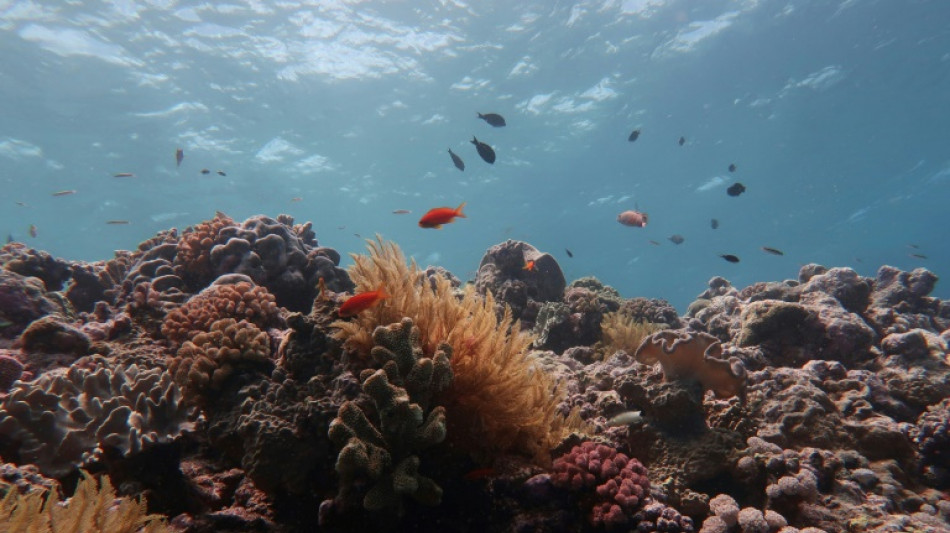
-
 Former Olympic champion Sharpe suffers heavy halfpipe crash
Former Olympic champion Sharpe suffers heavy halfpipe crash
-
Belarus says US failed to issue visas for 'Board of Peace' meeting

-
 Forest boss Pereira makes perfect start with Fenerbahce rout in Europa play-offs
Forest boss Pereira makes perfect start with Fenerbahce rout in Europa play-offs
-
Alcaraz fights back to book last four berth in Qatar

-
 England captain Itoje warns of 'corrosive' social media after abuse of Ireland's Edogbo
England captain Itoje warns of 'corrosive' social media after abuse of Ireland's Edogbo
-
War-weary Sudanese celebrate as Ramadan returns to Khartoum

-
 Townsend expects recalled Scotland duo to shine in Six Nations clash with Wales
Townsend expects recalled Scotland duo to shine in Six Nations clash with Wales
-
Peru's new president under fire for child sex comments

-
 UK king opens London fashion week despite brother's arrest
UK king opens London fashion week despite brother's arrest
-
Belarus frees opposition politician Statkevich

-
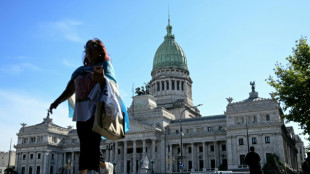 Striking Argentine workers slow down Buenos Aires in protest over labor reforms
Striking Argentine workers slow down Buenos Aires in protest over labor reforms
-
Starlink loss a blow to Russian forces in Ukraine: experts

-
 UN's Sudan probe finds 'hallmarks of genocide' in El-Fasher
UN's Sudan probe finds 'hallmarks of genocide' in El-Fasher
-
Belarus frees opposition politician Statkevich: wife

-
 Rocket re-entry pollution measured in atmosphere for first time
Rocket re-entry pollution measured in atmosphere for first time
-
Airbus ready to build two new European fighters if countries want

-
 Canada makes push to attract skilled migrants, including for defence
Canada makes push to attract skilled migrants, including for defence
-
US threatens to leave IEA if net zero focus remains
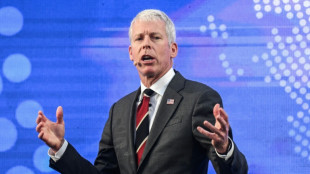
-
 Walmart outlines big AI ambitions as it reports mixed results
Walmart outlines big AI ambitions as it reports mixed results
-
Trump kicks off his 'Board of Peace,' as war clouds loom on Iran

-
 UK pubs to stay open late if home nations reach World Cup knockouts
UK pubs to stay open late if home nations reach World Cup knockouts
-
TotalEnergies in high-stakes French trial over climate change

-
 Bosnia probes fascist salutes at Croatian singer's concert
Bosnia probes fascist salutes at Croatian singer's concert
-
US and Israel issue dire warnings to Iran alongside US military buildup

-
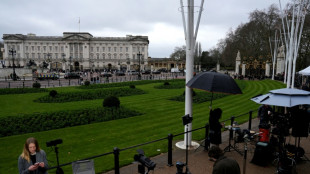 British public cheer Andrew's arrest with a smile and relief
British public cheer Andrew's arrest with a smile and relief
-
Argentine workers go on strike to protest Milei's labor reforms
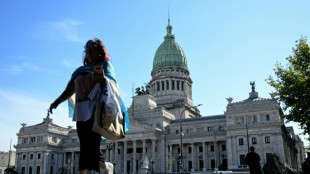
-
 Nakai targets Olympic skating upset as 'skimo' makes debut
Nakai targets Olympic skating upset as 'skimo' makes debut
-
What we know about ex-prince Andrew's friendship with Epstein

-
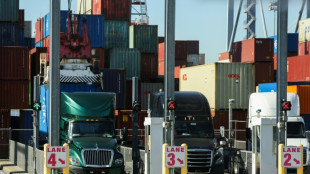 US trade deficit in goods widens to new record in 2025
US trade deficit in goods widens to new record in 2025
-
Oil extends gains on US-Iran tensions, stocks retreat
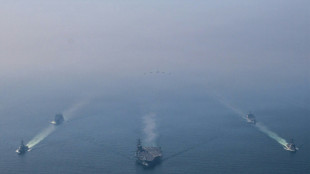
-
 Williams 'on the back foot' after missing Barcelona: Albon
Williams 'on the back foot' after missing Barcelona: Albon
-
Real Madrid submit evidence to UEFA in Vinicius racism probe

-
 Olympics rev up Milan's renewal but locals fear price to pay
Olympics rev up Milan's renewal but locals fear price to pay
-
Cardona Coll, Fatton win Olympic-debuting ski mountaineering sprint golds

-
 MSF will keep operating in Gaza 'as long as we can': mission head
MSF will keep operating in Gaza 'as long as we can': mission head
-
Russian Filippov wins first medal at Milan-Cortina Games for individual neutral athletes

-
 Italian Milan takes sprint honours at UAE Tour
Italian Milan takes sprint honours at UAE Tour
-
Dozens killed in jihadist attacks in northwest Nigeria

-
 Zimbabwe unbeaten in T20 World Cup after six-wicket Sri Lanka win
Zimbabwe unbeaten in T20 World Cup after six-wicket Sri Lanka win
-
Postecoglou admits taking Nottingham Forest post a 'bad decision'

-
 Switzerland's Fatton wins women's ski mountaineering sprint on Olympic debut
Switzerland's Fatton wins women's ski mountaineering sprint on Olympic debut
-
Kinghorn, Van der Merwe return for Scotland against Six Nations strugglers Wales

-
 Repsol says could boost Venezuela oil output over 50% in 12 months
Repsol says could boost Venezuela oil output over 50% in 12 months
-
UN says Israeli actions raise 'ethnic cleansing' fears in West Bank, Gaza

-
 Arteta tells faltering leaders Arsenal to harness Wolves 'pain' against Spurs
Arteta tells faltering leaders Arsenal to harness Wolves 'pain' against Spurs
-
Crowley gets nod for Irish as Prendergast drops out

-
 Unbeaten Swiss to meet Great Britain in Olympic men's curling semis
Unbeaten Swiss to meet Great Britain in Olympic men's curling semis
-
UK police arrest ex-prince Andrew on suspicion of misconduct

-
 Oil extends gains on US-Iran tensions, Europe stocks slide
Oil extends gains on US-Iran tensions, Europe stocks slide
-
Former prince Andrew, a historic downfall


UN urges ambitious action to protect the oceans
World leaders must do more to protect the oceans, a major United Nations conference concluded on Friday, setting its sights on a new treaty to protect the high seas.
"Greater ambition is required at all levels to address the dire state of the ocean," the UN Ocean Conference in Lisbon said in its final declaration.
The meeting in the Portuguese capital -- attended by government officials, experts and advocates from 140 countries -- is not a negotiating forum.
But it sets the agenda for final international negotiations in August on a treaty to protect the high seas -- those international waters beyond national jurisdiction.
"Biodiversity loss, the decline of the ocean's health, the way the climate crisis is going... it all has one common reason, which is... human behaviour, our addiction to oil and gas, and all of them have to be addressed," Peter Thomson, the UN Special Envoy for the Ocean, told AFP.
Oceans produce half the oxygen we breathe, regulate the weather and provide humanity's single largest source of protein.
They also absorb a quarter of CO2 pollution and 90 percent of excess heat from global warming, thus playing a key role in protecting life on Earth.
But they are being pushed to the brink by human activities.
Sea water has turned acidic, threatening aquatic food chains and the ocean's capacity to absorb carbon. Global warming has spawned massive marine heatwaves that are killing off coral reefs and expanding dead zones bereft of oxygen.
Humans have fished some marine species to the edge of extinction and used the world's waters as a rubbish dump.
- Patchwork of agreements -
Today, a patchwork of agreements and regulatory bodies govern shipping, fishing and mineral extraction from the sea bed.
Thomson said he was "very confident" national governments could agree on a "robust but operable" high seas treaty in August.
Tiago Pitta e Cunha, head of Portuguese foundation Oceano Azul (Blue Ocean) said: "Pressure has increased a lot on less interested countries to create an effective mechanism to protect the high seas."
Laura Meller from Greenpeace called for more action.
"We know that if words could save the oceans, then they wouldn't be on the brink of collapse," she told AFP.
"So in August when governments meet at the United Nations, they really need to finalise a strong global ocean treaty."
Efforts to protect the oceans will then continue at two key summits later this year -- UN climate talks in November and UN biodiversity negotiations in December.
- Overfishing, mining, plastic -
At the heart of the draft UN biodiversity treaty is a plan to designate 30 percent of Earth's land and oceans as protected zones by 2030.
Currently, under eight percent of oceans are protected.
A number of new, protected marine areas could be declared off-limits to fishing, mining, drilling or other extractive activities which scientists say disrupt fragile seabed ecosystems.
Making things worse is an unending torrent of pollution, including a rubbish truck's worth of plastic every minute, the United Nations says.
"The ocean is not a rubbish dump," UN Secretary General Antonio Guterres warned on Monday. "It is not a source of infinite plunder. It is a fragile system on which we all depend."
O.Norris--AMWN


